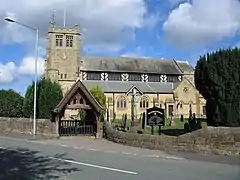St Matthew's Church, Buckley
St Matthew's Church, is in the town of Buckley, Flintshire, Wales. It is an active Anglican parish church in the deanery of Hawarden, the archdeaconry of Wrexham and the diocese of St Asaph.[1] The church is a Grade II* listed building.[2]
| St Matthew's Church, Buckley | |
|---|---|
 St Matthew's Church, Buckley, from the south | |

| |
| OS grid reference | SJ 284,646 |
| Location | Buckley, Flintshire |
| Country | Wales |
| Denomination | Anglican |
| Website | St Matthew's, Buckley |
| History | |
| Status | Parish church |
| Dedication | Saint Matthew |
| Dedicated | 1822 |
| Consecrated | 25 September 1822 |
| Architecture | |
| Functional status | Active |
| Heritage designation | Grade II* |
| Designated | 11 August 1997 |
| Architect(s) | John Oates, Douglas and Minshull (Restoration) |
| Architectural type | Church |
| Style | Gothic Revival |
| Groundbreaking | 1821 |
| Completed | 1905 |
| Specifications | |
| Materials | Stone, with timber-framed clerestory |
| Administration | |
| Parish | Church of St Matthew, Buckley, with the Church of the Good Shepherd, Drury |
| Deanery | Borderlands |
| Archdeaconry | Wrexham |
| Diocese | St Asaph |
| Province | Church in Wales |
| Clergy | |
| Vicar(s) | Fr Neil Kelly |
| Laity | |
| Churchwarden(s) | Chris Collins, Eirlys Jones |
History
The first church on the site was built in 1821–22 to a design by John Oates. It was a Commissioner's Church and the only church in Wales to be funded from the First Parliamentary Grant. Between 1897 and 1905 a series of restorations and additions were carried out by the Chester firm of architects, Douglas and Minshull. Vestries were added to the northeast of the church in 1897–99 and in 1900–01 a chancel with a polygonal apse was built. In 1902 the tower was re-modelled, reducing its height, and creating a baptistry within it. In the same year a porch was added at the southwest of the church. In 1904–05 the nave was reconstructed, adding a clerestory.[3]
Much of the work on the church from 1897 onwards was paid for by members of the family of W. E. Gladstone.[4] The vicar of the church during this time was Canon Drew, who was married to Gladstone's daughter. Mrs Drew paid for the building of the southwest porch with money she received for publishing letters written to her by John Ruskin.[3]
Architecture
Exterior
The church is built mainly in stone. Its plan consists of a nave with a clerestory, north and south aisles, a west tower, vestries at the northeast and a porch at the southwest. The clerestory is built in black-and-white timber framing.[3] This is the last major work in which Douglas used timber framing.[4]
Fittings and furniture
Paintings designed by Douglas are in panels below the clerestory and in the baptistry. Much of the wooden furniture, including the stalls and pulpit, are also by Douglas. A pair of candlesticks was designed by William Butterfield. Much of the stained glass is by Henry Holiday; one of the windows in the north aisle is by H. J. Stammers and another is by C. Ford Whitcombe.[3] The two-manual organ was built in 1905 by John Bishop & Sons of London. It was restored in 1959 and again in 1990.[5] There is a ring of eight bells which were cast in 1902 by John Taylor & Sons of Loughborough and donated to the church by Mrs Drew.[6]
External features
At the entrance to the churchyard is a timber-framed lych gate dated 1902 by Douglas[3] which is a Grade II listed building.[7]
References
- Deanery of Hawarden, Church in Wales, retrieved 26 June 2009
- Cadw, "St Matthew's Church (Grade II*) (18755)", National Historic Assets of Wales, retrieved 2 April 2019
- Hubbard, Edward (1986), Clwyd, The Buildings of Wales, London: Penguin, pp. 332–333, ISBN 0-14-071052-3
- Hubbard, Edward (1991), The Work of John Douglas, London: The Victorian Society, pp. 200–202, ISBN 0-901657-16-6
- The Organ, St Matthew's Church, Buckley, retrieved 26 June 2009
- St. Matthew's Company of Church Bellringers, St Matthew's Church, Buckley, retrieved 26 June 2009
- Cadw, "Lych Gate to St Matthew's Church (Grade II) (18756)", National Historic Assets of Wales, retrieved 2 April 2019